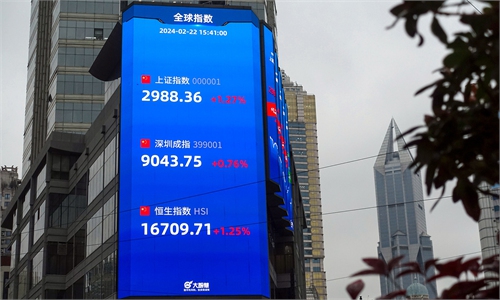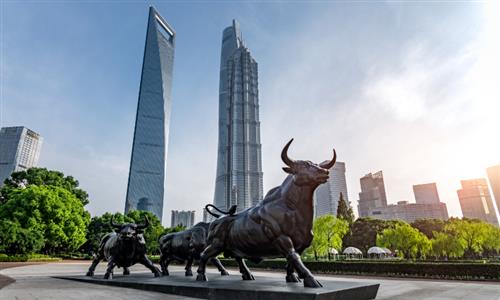
Illustration: Chen Xia/Global Times
China's A-share market is again making headlines as media outlets, citing Morgan Stanley analysts, said that "global funds are returning to China stocks." It seems that what has collapsed is the "China collapse" theory, not China's stock market.From time to time, the stock market experiences dramatic price changes, a phenomenon that is known as "volatility." However, some Western media outlets, such as the New York Times, are trying to politicize market volatility, using it as a tool to attack and smear the Chinese economy.
Their tricks to politicize economic volatility are evolving, and "political viruses" are constantly "mutating," in a bid to infect the capital market and spread panic. Investors' confidence in the stock market has plummeted because of the "political viruses."
Many Western economic observers do not understand the logic of China's A-share market. Unlike many of the world's stock markets, most trades on China's A-share market are made by individual retail investors, rather than institutional investors. In addition, China's retail investors trade more often than investors in Western countries.
As a result, some statistics show that the volatility of the benchmark Shanghai Composite Index is much more intense than major indexes in the US market.
The A-share market experienced substantial volatility in February, but the real story is not quite as grim as doomsayers suggest. Some Westerners like to exaggerate the risks faced by the Chinese economy and politicize economic issues, depicting short-term challenges as systemic risks. It's an old trick of hyping the so-called "collapse theory" to attack and smear the Chinese economy or even overall economic governance.
In recent days, the stock market has seen a sustained rebound, with some financial institutions voicing intentions to boost their holdings. "A shift away from Chinese equities by global long-term investors has taken a pause, with some funds getting less bearish," media reports said, citing Morgan Stanley.
Overseas financial institutions have responded faster than ever to the recent market rebound. This shows that the "China collapse" theory is having an increasingly weak impact. Although there is a strong possibility of further volatility, given continued anxiety among some individual investors, the confidence of institutional investors is recovering.
The bulls have been given ammunition against the bears by a flurry of support measures. The authorities have taken various steps to stabilize the market and boost investors' confidence. The measures include improving the quality of listed companies at the source, with more focus on strict control over IPO access and stepped-up supervision, inspection of companies with IPO plans and crackdowns on financial fraud.
In February, the People's Bank of China, the central bank, acted aggressively to cut the benchmark five-year loan prime rate (LPR) by 25 basis points to 3.95 percent, the largest rate rollback since the LPR system was introduced five years ago. China still has many policy options in its toolbox, which can be seen as vital to maintaining the stability of China's stock market.
There is no reason to panic. China has the ability to maintain financial stability even in the worst-case scenario of market volatility triggered by internal and external factors.
First, China's economic fundamentals remain stable. Observers believe that the government's GDP growth target of about 5 percent for this year is achievable.
Second, the government's push for economic reform is expected to unleash new sources of growth. There are great opportunities ahead in emerging sectors such as technology-related businesses.
Investors are closely watching China. Its stock market does have structural issues and has a lot of room for further reforms, but it also offers good trading opportunities. There will be both challenges and opportunities related to China's A-share market. Investors who remain rational about the Chinese economy can make money.
The author is a reporter with the Global Times. bizopinion@globaltimes.com.cn


